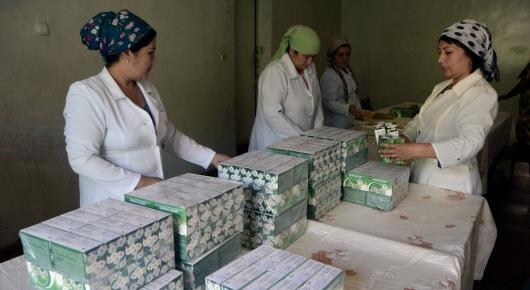FAO, Uzbekistan lay foundations of cooperation through 2022

Uzbekistan is more a land of deserts and mountains than of rich, black soil. Still, with a commitment to make the most of its limited agricultural resources, and with help from partners and the international community, the country has been making considerable progress.
Now, building on their long-standing cooperation, FAO and Uzbekistan have signed a Country Programming Framework document giving impetus and further guidance to their partnership through 2022.
FAO will provide support in three priority areas agreed with the Government of Uzbekistan: institutional and policy assistance for the Ministry of Agriculture and other government institutions; agricultural and food value chain development and market access; and sustainable management of natural resources, climate change and biodiversity.
“The main emphasis of FAO’s work in Europe and Central Asia strongly overlaps with the pursuit of Uzbekistan to make its agriculture more effective and sustainable, providing livelihood opportunities for rural populations,” said Viorel Gutu, FAO Representative in Uzbekistan. “Considering the Organization’s mandate and experience, we can make significant contribution to these three areas – in cooperation with other United Nations agencies and international organizations.”
Agriculture accounts for 17 percent of the gross domestic product (GDP), and it provides a living for 25 percent of the employed population, despite that only about 9 percent of the total area is cultivated. Therefore, the importance of the sector cannot be overstated.
In the past 25 years, the country has managed to gradually move away from cotton monoculture towards a more diversified palette of agricultural produce, including cereals, potatoes, vegetables and melons. Expanding the cultivated area and increasing yields made Uzbekistan almost completely self-sufficient in all locally sourced basic food products, and an exporter of certain grains.
These were achieved in line with international principles of sustainable development, which continue to have a strong impact on the country.
“Agriculture in Uzbekistan is rather sensitive to climatic and weather conditions, especially to arid periods and water shortages,” said Alisher Shukurov, Assistant FAO Representative in Uzbekistan. “Negative developments of the past three decades, including salinization, erosion and contamination of the soil, make the sector even more vulnerable for the future.”
Sustainable agriculture and rural development are important building blocks of the road leading to the achievement of the globally accepted Sustainable Development Goals (SDGs). In 2016, soon after their approval, the Uzbek Government started working systematically to develop a comprehensive national agenda in line with SDGs, defining goals and targets for the period up to 2030.
The plan is for FAO to share its knowledge on innovative climate-smart practices and the sustainable use and management of natural resources, including forest management and land rehabilitation. Specifically, Uzbekistan will be assisted in establishing a national forest inventory and monitoring system. FAO will help the country manage locusts and combat other transboundary pests and diseases.
Under another priority area, global sustainability goals also be incorporated in the planned comprehensive Agricultural Development Strategy, supported by FAO. The strategy should shape the structural, institutional and technological transformation of the sector for the coming 10–15 years.
FAO will also help in the implementation of the strategy by ensuring better coordination mechanisms and more effective and participatory decision-making related to the development of the sector.
For further improvement of the agriculture and food sector, FAO will assist Uzbekistan in introducing an international system that ensures the quality and safety of primary and processed agrifood products for both the domestic and foreign markets. Pilot projects for value chain development in selected areas, training in sustainable agricultural production methods, and the gradual introduction of modern technologies should strengthen rural livelihoods.
The Country Programming Framework for Uzbekistan is in line with the United Nations Development Assistance Framework for the country, and it’s part of FAO’s regional initiatives on smallholders and family farms, agrifood trade and market integration, and sustainable natural resource management.
17 January 2019, Tashkent, Uzbekistan
